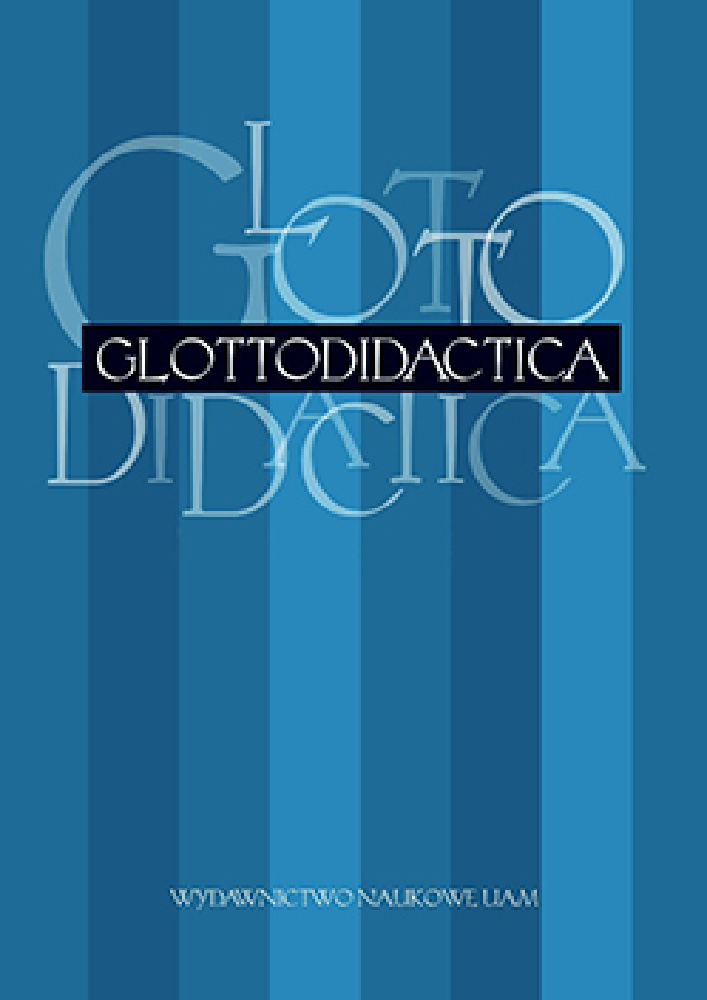Abstract
The paper deals with verbal meaning deficiencies caused by lack of explicit knowledge occurring in Polish and German monolingual dictionaries with respect to the morphological categories of aspect and manner of action. The author shows that contrastive analysis has proved to be the chief means of identifying meaning and rendering implicit knowledge explicit, thus giving birth to the concept of horizontal lexicography and its realization.
References
Anderson, R.W. (Hrsg.) (1981). New Dimensions in Second Language Acquisition Research. Rowley, Mass.: Newbury House.
Bańko, M. (2000). Inny słownik języka polskiego. Warszawa: Wydawnictwo Naukowe PWN.
Bialystok, E. (1978). A Theoretical Model of Second Language Learning. Language Learning, 28, 69–83. DOI: https://doi.org/10.1111/j.1467-1770.1978.tb00305.x
Bialystok, E. (1981). Some Evidence for the Integrity and Interaction of Two Knowledge Sources. In: R. W. Anderson (Hrsg.), New Dimensions in Second Language Acquisition Research (S. 62–74). Rowley, Mass.: Newbury House.
Bialystok, E. (1982). On the Relationship Between Knowing and Using Linguistic Forms. Applied Linguistics, 3, 181–206. DOI: https://doi.org/10.1093/applin/3.3.181
Bialystok, E. (1994). Representation and Ways of Knowing. Three Issues in Second Language Acquisition. In: N. E. Ellis (Hrsg.), Implicit and Explicit Learning of Language (S. 549–569). London: Academic Press.
Börner, W. (1997). Implizites und explizites Wissen im fremdsprachlichen Wortschatz. In: Fremdsprachen Lehren und Lernen, 26, 44–67.
Börner, W. (2000). Didaktik und Methodik der Wortschatzarbeit: Bestandsaufnahme und Perspektiven. Germanistische Linguistik, 155–156, 29–56.
Börner, W. / Vogel, K. (Hrsg.) (2002). Grammatik und Fremdsprachenerwerb. Kognitive, psycholinguistische und erwerbstheoretische Perspektiven (= Tübinger Beiträge zur Linguistik 462). Tübingen: Gunter Narr Verlag.
DUDEN (2011). Deutsches Universalwörterbuch. Mannheim/Wien/Zürich: Bibliographisches Institut.
Edmondson, W. / House, J. (1997). Zur Einführung in den Themenschwerpunkt. In: Edmondson, W. / House, J. (Koord.) Themenschwerpunkt: Language Awareness. Fremdsprachen Lehren und Lernen, 26, 1–8.
Edmondson, W. / House, J. (Koord.) (1997). Themenschwerpunkt: Language Awareness. Fremdsprachen Lehren und Lernen, 26.
Ellis, N. E. (Hrsg.) (1994). Implicit and Explicit Learning of Language. London: Academic Press.
Ellis, R. (1994). A Theory of Instructed Second Language Acquisition. In: N. E. Ellis (Hrsg.), Implicit and Explicit Learning of Language (S. 79–114). London: Academic Press.
Götz, D. / Haensch, G. / Wellmann, H. (1997). Langenscheidts Großwörterbuch Deutsch als Fremdsprache. Berlin, München et al.: Langenscheidt. DOI: https://doi.org/10.1515/9783110916713.345
Haider, H. (1993). Was ist implizit am impliziten Wissen und Lernen? Sprache & Kognition, 12 (44–52).
Krashen, S. D. (1981). Second Language Acquisition and Second Language Learning. Oxford: Pergamon.
Krashen, S. D. (1982). Principles and Practice in Second Language Acquisition. Oxford: Pergamon.
Odlin, T. (1986). On the Nature and Use of Explicit Knowledge. IRAL, 24, 123–141. DOI: https://doi.org/10.1515/iral.1986.24.1-4.123
Pfeiffer, W. (2001). Nauka języków obcych. Od praktyki do praktyki. Poznań: Wagros.
Rampillon, U. / Zimmermann, G. (Hrsg.) (1997). Strategien und Techniken beim Erwerb fremder Sprachen. Ismaning: Hueber.
Raupach, M. (2002). „Explizit/implizit in psycholinguistischen Beschreibungen – eine unendliche Geschichte? In: W. Börner / K. Vogel (Hrsg.), Grammatik und Fremdsprachenerwerb. Kognitive, psycholinguistische und erwerbstheoretische Perspektiven (= Tübinger Beiträge zur Linguistik 462) (S. 99–117). Tübingen: Gunter Narr Verlag.
Schlak, T. (1999). Explizite Grammatikvermittlung im Fremdsprachenunterricht? Das Interface- Problem Revisited. Fremdsprachen und Hochschule, 56, 5–33.
Schmidt, R. (1994). Deconstructing Consciousness in Search of Useful Definitions for Applied Linguistics. AILA Review, 11, 11–26.
Schwenk, H.-J. (2009). Die Semantik der Imperfektiv-Perfektiv-Opposition im Polnischen und ihr Niederschlag in polnisch-deutschen Wörterbüchern. Versuch einer aspektologisch-aspektographischen Neuorientierung (= Danziger Beiträge zur Germanistik 26). Frankfurt/M. u.a.: Lang.
Schwenk, H.-J. (2010). Bilinguale Lexiko-Aspektographie. Polnisch-deutsches und deutsch-polnisches Wörterbuch ausgewählter Verben (= Studia Slavica Oldenburgensia 19). Oldenburg: BIS-Verlag der Carl von Ossietzky Universität.
Schwenk, H.-J. (2011). Vom Fremdverständnis zum Eigenverständnis. Kontrastive Linguistik und Glottodidaktik. Glottodidactica, 37, 7–18. DOI: https://doi.org/10.14746/gl.2011.37.1
Stern, H. H. (1992). Issues and Options in Language Teaching. Oxford: Oxford University Press.
Tönshoff, W. (1997). Training von Lernstrategien im Fremdsprachenunterricht unter Einsatz bewusstmachender Vermittlungsverfahren. In: U. Rampillon / G. Zimmermann (Hrsg.), Strategien und Techniken beim Erwerb fremder Sprachen (S. 203–215). Ismaning: Hueber.
Wahrig, G. (2002). Deutsches Wörterbuch. Gütersloh: Bertelsmann.
License
Copyright (c) 2018 Hans Jörg Schwenk

This work is licensed under a Creative Commons Attribution-NoDerivatives 4.0 International License.
Authors
Authors of texts accepted for publication in Glottodidactica are required to complete, sign and return to the Editorial team’s office the Agreement for granting a royalty-free license to works with a commitment to grant a CC sub-license.
Under the agreement, the authors of the texts published in Glottodidactica grant Adam Mickiewicz University in Poznań a non-exclusive, royalty-free license and authorize the use of Attribution-NoDerivatives 4.0 International (CC BY-ND 4.0) Creative Commons sub-license.
The authors retain the right to the free disposal of the work.
Users
Interested Internet users are entitled to use works that have been published in Glottodidactica since 2016, under the following conditions:
▪ attribution – obligation to provide, together with the distributed work, information about the authorship, title, source (link to the original work, DOI) and the license itself.
▪ no derivatives – the work must be preserved in its original form. Without the author's consent, it is not possible to distribute the modified work in the form of translations, publications, etc.
Copyrights are reserved for all texts published before 2016.
Miscellaneous
Adam Mickiewicz University in Poznań retains the property right as a whole (layout, graphic form, title, cover design, logo etc.).
Privacy statement
The names and email addresses published on this journal site will be used exclusively for the purposes declared by this journal and cannot be used for any other purpose or by any other party.





